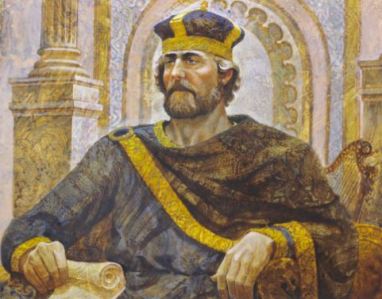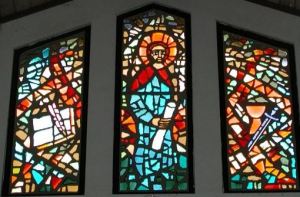 In this third post wherein I provide my review and thoughts on Daniel Kirk’s A Man Attested by God: The Human Jesus of the Synoptic Gospels I will focus on the section entitled “Kings in Worship and Rule.” In this part of the book Kirk lays out the evidence demonstrating that the Israelite king was regularly represented as the idealized human being, one who embodies God’s rule upon the earth.
In this third post wherein I provide my review and thoughts on Daniel Kirk’s A Man Attested by God: The Human Jesus of the Synoptic Gospels I will focus on the section entitled “Kings in Worship and Rule.” In this part of the book Kirk lays out the evidence demonstrating that the Israelite king was regularly represented as the idealized human being, one who embodies God’s rule upon the earth.
Many texts are discussed in this section, so I will offer a brief summary of his arguments and accompany them with a few thoughts of my own:
- David in Historical Texts (Scripture) – The Davidic dynasty is understood as
 God’s son on earth per 2 Sam 7:14 (cf. Psa 2:7). 2 Samuel’s reworking in 1 Chronicles 17:11-14 signifies that the Davidic kingdom is also the kingdom of God, indicating that the human ruler is the one through whom God is/will be enacting his sovereignty.
God’s son on earth per 2 Sam 7:14 (cf. Psa 2:7). 2 Samuel’s reworking in 1 Chronicles 17:11-14 signifies that the Davidic kingdom is also the kingdom of God, indicating that the human ruler is the one through whom God is/will be enacting his sovereignty. - Psalm 45 – The Davidic king here (likely Solomon in my opinion) is called “God,” although there is another God above him (“your God has anointed you”). Both Yahweh and the Israelite king can rightfully be called “God.” This language evoke the similar terms used of Moses, the prophet who functioned as God to Pharaoh. Psalm 45 is significant because this is the text which the author of Hebrews uses to call Jesus “God” (Heb 1:8), and this author includes in his citation the part of the human king having a God above him.
- Psalm 72 – Kirk notes that the tsi’im in 72:9 (71:9 MT) are better rendered as animal desert dwellers, therefore indicating that animals will bow down in prostration to this idealized human king. This recalls the language of Adam in Gen 1:26-28 where the idealized human ruled over the animals as God’s viceroy. Kirk also notes that the name of this idealized king is petitioned to flourish “before the sun” (72:17), a statement used to describe the notional preexistence of the Messiah’s name in Rabbinic Judaism. Since the phrase “before” (liphnai) can be temporal as well as spatial, this very well may be a reference to preexistence of God’s idealized king’s name before the sun was created.
- Psalm 89 – Another major psalm echoing the promised of 2 Samuel 7’s Davidic covenant. Particularly of interest is that the anointed Davidic king will possess the ability to control the sea and the waves, and the waters in Judaic thought are usually regarded as personifications of the chaotic evil. God, who generally reserves the ability to control nature, extends this function unto the Davidic king, the son of God.
- Solomon’s Throne and Worship in 1 Chronicles – Both David and Yahweh are
 worshiped, being the recipients of a single verb in 1 Chron 29:20. In 1 Chron 29:23 Solomon sits on the throne of Yahweh, indicating that Yahweh has invested his personal rule and throne upon the earth so that the human king can function as his embodied representative. The Israelite king, therefore, is the visible presence of Yahweh.
worshiped, being the recipients of a single verb in 1 Chron 29:20. In 1 Chron 29:23 Solomon sits on the throne of Yahweh, indicating that Yahweh has invested his personal rule and throne upon the earth so that the human king can function as his embodied representative. The Israelite king, therefore, is the visible presence of Yahweh. - Isaiah 9:6-7 – The idealized king, likely originally referring to Hezekiah, is called “Mighty God” and “Everlasting Father.” He will also function as the human embodiment of Yahweh, the divine warrior ushering in the peaceful reign of God. Elijah was a “father” to Elisha (2 Kings 2:12).
- Ezekiel 34 – Long after King David has died, the restoration of the kingdom envisions the restoration of the Davidic dynasty. This idealized king will function as the shepherd of the people (34:23), sharing in the responsibilities of shepherding which Yahweh himself will perform (34:11-16). In other words, the restored Davidic king will share in the functions of Yahweh as the idealized human ruler.
- Micah 5 – This promised ruler, whose origins extend “from days of old” (miyamai olam), reach back to the ancient Davidic family (not back to eternity). God will bestow upon this ruler his strength and glory. More striking is the indication that God’s own name will be shared with this promised Davidic king (Micah 5:4; 5:3 MT). This is no different from Yahweh extending his throne down to earth upon which Solomon was to rule as the human king in 1 Chronicles.
- Zechariah 12 – Yahweh, functioning as the divine warrior, is spoken of in conjunction with the idealized human king. Zechariah 12:8 importantly notes that the house (dynasty) of David will be “like God” (c’elohim), further overlapping the functions of the idealized human ruler and Israel’s God.
- Psalms of Solomon – Chapter 17 of this work regards the idealized Davidic king playing the role of God on earth, particularly over Israel. Kirk quotes John Collins who remarks that, “The kingship of God… is implemented though human kingship.” There are other echoes in the Psalms of Solomon where the idealized king’s mission to rule over the Gentiles seems to be deliberately drawing upon Psa 2:7-9, where the human Son of God will smash the nations with a rod of iron. Furthermore, Kirk points out that while Isa 66:18 says that Yahweh knows the thoughts of the people, Psalms of Solomon 17:25 says that the human Davidic king is the one who now possesses this prerogative. The fact that the promised Messiah could be spoken of as possessing the ability to know the thoughts of humans has massive implications upon similar texts in John’s Gospel and Rev 2:23.
- Animal Visions of 1 Enoch – In the midst of a vision of sheep, a champion arises to sit on the throne for the Lord (90:9). This enthroned ruler is thus playing the role of God as both king and judge of the people (90:20).
- Qumran References to the Idealized King – 4Q246 notes how God will wage war on behalf of the human king (who is called “son of God”). 4QFlor states that the idealized king will function as the agent of deliverance for God, drawing upon the prophecy of Amos 9:11, itself a promised of the restored Davidic dynasty. 4Q521, which has precipitated a
 plethora of interpretations by scholars (about which Kirk shows awareness), notes how the God’s anointed one will be obeyed/listened to by the heavens and the earth. This recalls the primordial Adam image who functioned as the crowning achievement of the original creation, ruling over everything God had created.
plethora of interpretations by scholars (about which Kirk shows awareness), notes how the God’s anointed one will be obeyed/listened to by the heavens and the earth. This recalls the primordial Adam image who functioned as the crowning achievement of the original creation, ruling over everything God had created.
Kirk has demonstrated that the images describing the Israelite kings (primarily David and Solomon) as idealized rulers in whom God embodies his attributes and sovereignty can abundantly be observed in both the Hebrew Bible and in a variety of texts in Second Temple Judaism. Combined with the case which Kirk has already established regarding the images of Adam, Moses, and prophets like Elijah, these Israelite kings provide fertile soil out of which the Synoptic evangelists can grow their depiction of Jesus as the idealized human being. This first chapter of the book is proving to be a solid reconstruction of how Judaism’s strict monotheism could incorporate these human figures as mortal “embodiments” of Israel’s God, carrying out his rule and purposes.
Stay tuned for further updates on A Man Attested by God.

Reblogged this on Talmidimblogging.